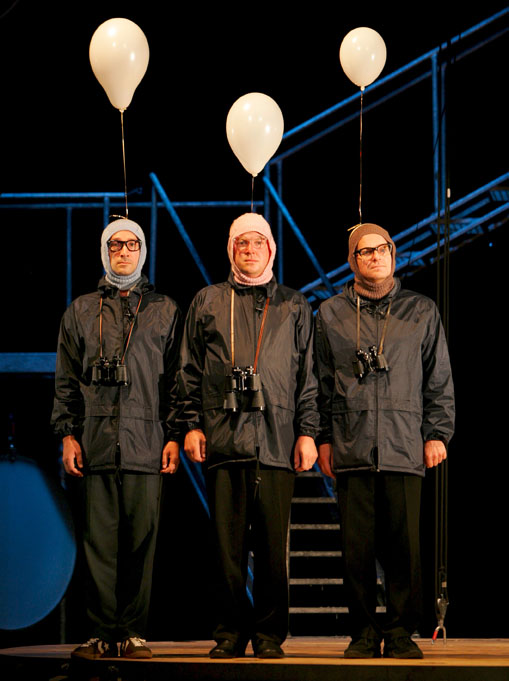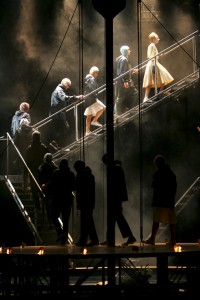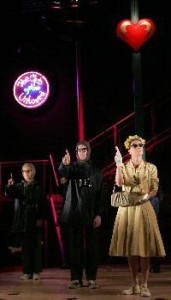 The mark of great drama is often its ability to use humour. The juxtaposing of comedy and tragedy is a great tool which, when used skilfully can produce great theatre. As we all know, all good comedy contains elements of tragedy (witness Steptoe and Son, Kneehigh’s previous production) but there is a certain skill involved in taking a full blown tragedy and discovering the comedy within it. Kneehigh always manage to do this and their production of Tristan and Yseult at the The Bristol Old Vic is a master-class in how it can and should be done.
The mark of great drama is often its ability to use humour. The juxtaposing of comedy and tragedy is a great tool which, when used skilfully can produce great theatre. As we all know, all good comedy contains elements of tragedy (witness Steptoe and Son, Kneehigh’s previous production) but there is a certain skill involved in taking a full blown tragedy and discovering the comedy within it. Kneehigh always manage to do this and their production of Tristan and Yseult at the The Bristol Old Vic is a master-class in how it can and should be done.
As great, tragic love stories go, Tristan & Yseult (or Isolde as she is perhaps better known) ranks alongside Romeo & Juliet and Abelard & Heloise, but its origins go back centuries earlier, back to the earliest, mist-shrouded history of the British Isles. The tale predates even the Arthurian romance of Lancelot & Guinevere.
 It was of course Richard Wagner who made the legend famous with his magnificent opera but it has now fallen to Kneehigh to pick up the baton and run with it. And run with it they certainly do. But not only do they run, they hop, skip and jump; they swing from ropes and make their entrances via a trampoline in order to squeeze every drop of potential from the story. They bring tears to the eyes, both of laughter and sadness. The changes from comedy to tragedy sometimes occur in the blink of an eye, all the more powerful for their suddenness. It’s like being tapped on the shoulder and turning to receive, not a smile, but a slap in the face. Emma Rice’s Tristan and Yseult is like Richard Wagner meets Monty Python, with Terry Scott playing the pantomime dame.
It was of course Richard Wagner who made the legend famous with his magnificent opera but it has now fallen to Kneehigh to pick up the baton and run with it. And run with it they certainly do. But not only do they run, they hop, skip and jump; they swing from ropes and make their entrances via a trampoline in order to squeeze every drop of potential from the story. They bring tears to the eyes, both of laughter and sadness. The changes from comedy to tragedy sometimes occur in the blink of an eye, all the more powerful for their suddenness. It’s like being tapped on the shoulder and turning to receive, not a smile, but a slap in the face. Emma Rice’s Tristan and Yseult is like Richard Wagner meets Monty Python, with Terry Scott playing the pantomime dame.
The stage is peopled at all times by anoraked, balaclava-helmeted, bespectacled nerds, searching for love through the binoculars that dangle from their scrawny necks. They are all members of the Club of the Unloved and discover that when they do finally spot the elusive love bird, the vulture of hate is circling not far above waiting to pick the flesh from the corpse of passion.
 There are some sublime moments of comedy. The scene where Frocin, beautifully and frenetically played by Giles King, struggles to collect evidence of Yseult’s infidelity with Tristan while dangling upside-down from a pole with a microphone and Polaroid camera is hilarious. However, to me, one of the funniest lines, and one of the most Monty Pythonesque, was almost a throwaway. There is high drama as the kingdom of Kernow (Cornwall) is invaded by the Irish. Their ranting, gangster-like leader, after a bit of River Dancing, sneeringly complains about the soppy harp music playing in the background only to be told by an indignant, Fair Isle pullovered musician that, “It’s not a harp , it’s a dulcimer.” From where I was sitting I couldn’t quite see him, but I imagined he looked like Michael Palin with a knotted hankie on his head. Pure magic. It is hard to pick out individual performances because they were all so good, but I think Craig Johnson in a frock as Brangian, Yseult’s hand-maiden and marital bed substitute, came closest to stealing the show.
There are some sublime moments of comedy. The scene where Frocin, beautifully and frenetically played by Giles King, struggles to collect evidence of Yseult’s infidelity with Tristan while dangling upside-down from a pole with a microphone and Polaroid camera is hilarious. However, to me, one of the funniest lines, and one of the most Monty Pythonesque, was almost a throwaway. There is high drama as the kingdom of Kernow (Cornwall) is invaded by the Irish. Their ranting, gangster-like leader, after a bit of River Dancing, sneeringly complains about the soppy harp music playing in the background only to be told by an indignant, Fair Isle pullovered musician that, “It’s not a harp , it’s a dulcimer.” From where I was sitting I couldn’t quite see him, but I imagined he looked like Michael Palin with a knotted hankie on his head. Pure magic. It is hard to pick out individual performances because they were all so good, but I think Craig Johnson in a frock as Brangian, Yseult’s hand-maiden and marital bed substitute, came closest to stealing the show.
Through all this, Wagner and impending tragic dénouement are never far away. The play starts with the opening bars of the opera’s overture, played on an old Dansette record player, and ends with its tear-jerking closing theme. The death of Tristan is as dramatic and devastating as the climax in any grand opera production, whether it be Covent Garden, La Scala or the Met. The members of the audience, having been persuaded to sit comfortably for two hours, look down to find someone has crept up behind them and stuck a dagger through their hearts. Powerful stuff.
This is the fourth production by Kneehigh I have seen in as many years. It is certainly the most ambitious and beyond doubt the most successful. I urge you to see it. ★★★★★ Michael Hasted 13th July 2013

